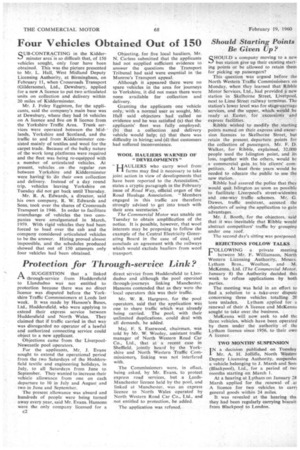Should Starting Points Be Given Up?
Page 38

If you've noticed an error in this article please click here to report it so we can fix it.
QI-IOULD a company moving to a new L) bus station give up their existing starting points or be allowed to retain them for picking up passengers?
This question was argued before the North Western Traffic Commissioners on Monday, when they learned that Ribble Motor Services, Ltd., had provided a new station in Skelhorne Street, Liverpool, next to Lime Street railway terminus. The station's lower level was for stage-carriage services, and the upper, which wotild be ready at Easter, for excursions and express facilities.
Ribble wished to modify. the ,:Starting points named on their express and excursion licences to Skelhorne Street, but retain the present, departure points for the collection of passengers. Mr. F. D. Walker, for Ribble, explained, 32,000 people used the Islington point, and its loss, together with the others, would be a commercial gain to his clients' competitors. At least three years would be needed to educate the public to use the new station.
Ribble had assured the police that they would quit Islington as soon as possible to facilitate Liverpool's street-widenine and one-way traffic schemes. Mr. G. Dawes, traffic assistant, accused the objectors of using the application to gain advantages.
Mr. J. Booth, for the objectors, said that it was inevitable that Ribble would abstract competitors' traffic by groupine under one roof.
The second day's sitting was postponed








































































































